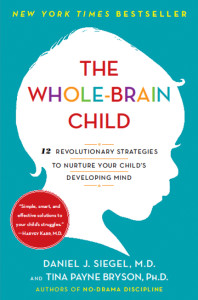Book Review: The Whole-Brain Child by Daniel Siegel, M.D. and Tina Payne Bryson, Ph.D.
 The Whole-Brain Child is an excellent resource for caregivers looking to develop a better understanding of their child’s development. Siegel and Bryson have broken down the complexities of neurobiology into a reader-friendly guide that includes practical parenting strategies. The book helps caregivers think creatively and turn daily interactions with your child into healthy brain-shaping moments.
The Whole-Brain Child is an excellent resource for caregivers looking to develop a better understanding of their child’s development. Siegel and Bryson have broken down the complexities of neurobiology into a reader-friendly guide that includes practical parenting strategies. The book helps caregivers think creatively and turn daily interactions with your child into healthy brain-shaping moments.
By explaining the neuroscience behind brain development, the reader learns how a child’s brain is wired. The “left brain” is in charge of logic, and the “right brain” is in charge of emotions. Children are mostly functioning from their right brain until the age of 3 years old. The “downstairs brain” is in charge of our most basic primal instincts – breathing, blinking, innate reactions (fight or flight response) and our strongest emotions – fear and anger. The “upstairs brain” is the most sophisticated part and is in charge of thinking, planning, regulating emotions, and making decisions. However, the “upstairs brain” does not fully develop until the mid-twenties. Educating caregivers about typical brain development helps them to understand why a child may be having a tantrum, an argument, or sulking in silence.
The concrete strategies that Siegel and Bryson suggest help caregivers to move away from responding to their children reactively and instead suggest trying to notice which part of the brain you are trying to appeal to. For example, if a child is coming to you completely overwhelmed with emotions (sobbing, hysterical, angry, etc.) and is unable to think – the caregiver first wants to respond to the emotion (the right side of the brain) rather than trying to use logic or reason to help a child calm down. Often times when a children are upset they can’t access their logical brain and need first to have their right brain’s emotional needs addressed.
In addition to supporting a child’s emotional intelligence the book also provides strategies for helping kids develop their memory, self-awareness and empathy. There are great recommendations for games, books, exercises and visuals for educating children about emotions and brain development so that they can feel more control over what’s happening in their bodies.
For more information or to purchase this book please click here.
Written by Kelly DiBenedetto, LMHC, ATR
Boston Post Adoption Resources